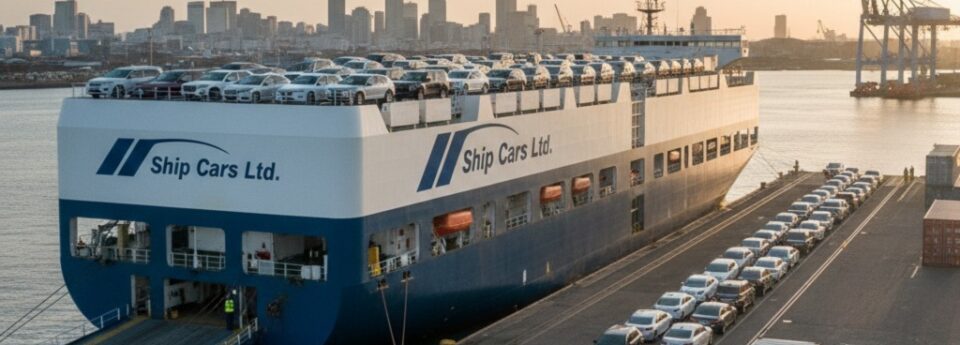
Your Comprehensive Guide to Importing & Exporting Vehicles with Ship Cars Ltd.
Ship Cars Ltd. is your trusted partner for seamless vehicle import and export services from the UK. Navigating the complexities of international shipping, customs regulations, and destination-specific requirements can be daunting. This guide aims to provide you with the complete information you need, whether you are exporting a vehicle from the UK or importing one. Our expertise covers all types of vehicles, from cars and motorcycles to commercial trucks and specialised machinery, ensuring a safe, efficient, and cost-effective process. Ship Cars Ltd
Understanding Import & Export Processes
International vehicle shipping involves a series of steps governed by UK export regulations and the import laws of your destination country.
Key Steps in the Process:
- Quotation & Booking: Understanding your vehicle type, destination, and preferred shipping method (RoRo, container, etc.).
- Documentation Preparation: Gathering all necessary UK export paperwork.
- Vehicle Preparation: Ensuring your vehicle is ready for transit, including cleaning and any required maintenance.
- UK Export Procedures: Handling customs declarations and port arrangements.
- Shipping: Transporting your vehicle via sea freight.
- Destination Procedures: Navigating import customs, duties, taxes, and inspections at the arrival port.
- Collection: Finalising import procedures for collection of your vehicle.
Destination Country Regulations: A Global Overview

Importing or exporting a vehicle involves adhering to rules in both the country of origin and the destination country. These generally fall into three categories:
- Permanent Export/Import
This applies when a vehicle is intended for permanent registration and use in the destination country.
- Vehicle Standards: Most countries have specific safety, emissions, and roadworthiness standards (e.g., ADRs in Australia, FMVSS in the US). Vehicles may need to comply with these, which can involve modifications and inspections.
- Age Restrictions: Some countries have limits on how old a vehicle can be to be imported for permanent use.
- Right-Hand Drive (RHD) vs. Left-Hand Drive (LHD): Many countries have regulations based on the steering wheel position.
- Authorities: Typically managed by the destination country’s Customs Authority, Ministry of Transport, and environmental agencies.
- Transfer of Residence (ToR)
This scheme allows individuals relocating permanently to a new country to import their personal vehicle, often with exemptions from duties and taxes.
- Eligibility: Generally requires the vehicle to have been owned and used by the individual in their previous country of residence for a minimum period (e.g., 6-12 months). Proof of residency and intent to reside permanently is essential.
- Conditions: The vehicle usually cannot be sold or transferred for a specified period after import.
- Documentation: Requires extensive proof of ownership, usage history, and residency status.
- Authority: Administered by the destination country’s Customs authority. Note that this usually applies to personal vehicles, not commercial ones.
- Temporary Importation
This allows non-residents to import a vehicle for a limited duration for specific purposes (tourism, events, temporary work), usually without paying full import duties and taxes.
- Permits: A Temporary Importation Permit (TIP) or Carnet de Passages en Douanes (CPD) is often required.
- Duration: The vehicle must be re-exported within a specified timeframe (e.g., 6-12 months).
- Restrictions: Prohibits the vehicle from being sold, hired out, or used for commercial purposes within the country.
- Authorities: Managed by the destination country’s Customs authority.
Inspections and Permits: Ensuring Compliance
Most countries mandate inspections and may require specific permits to ensure imported vehicles meet local standards.
- Pre-Shipment Inspections: Some countries require vehicles to be inspected in the UK before shipment to verify their condition, value, and compliance with certain standards.
- Quarantine Inspections: Crucial for countries like Australia, New Zealand, and some others, to prevent the introduction of pests and diseases. Vehicles must be immaculately cleaned before shipping.
- Roadworthiness & Safety Inspections: Conducted either pre-shipment or upon arrival to ensure the vehicle meets local safety and operational standards.
- Emissions Testing: Required in many developed countries to comply with environmental regulations.
- Permits: Depending on the import category and destination country, specific permits (e.g., Vehicle Import Approval (VIA) in Australia, Temporary Import Permits) may be necessary. These are typically obtained from the destination country’s relevant government bodies.
Essential Paperwork: UK Export & Destination Import

Accurate and complete documentation is paramount for a smooth international vehicle shipping process.
UK Export Documentation:
- Vehicle Registration Document (V5C): The primary document proving ownership in the UK.
- Bill of Sale: If the vehicle has been recently purchased.
- Shipper’s Instruction Form: Provided by Ship Cars Ltd.
- Passport / Photographic ID: For the exporter.
- Export Declarations: Ship Cars Ltd. handles these on your behalf for HMRC compliance.
- VAT Exemption Proof: For vehicles being permanently exported, documentation is needed to reclaim or avoid VAT.
Destination Port Import Documentation:
Requirements vary significantly by country but commonly include:
- Bill of Lading (or Air Waybill): The contract of carriage issued by the shipping company.
- Proof of Ownership: Original V5C, title, or equivalent document from the country of origin.
- Passport / Photographic ID: For the importer.
- Import Declaration: Specific customs forms required by the destination country.
- Compliance Certificates: Evidence of meeting local safety, emissions, or roadworthiness standards.
- Transfer of Residence (ToR) Documentation: If claiming ToR exemptions.
- Temporary Importation Permit (TIP) / Carnet de Passages en Douanes (CPD): For temporary imports.
- Pre-Shipment Inspection Certificate: If mandated by the destination country.
We strongly advise engaging a local clearing agent at your destination country to navigate customs procedures efficiently.
Why Ship Vehicles Internationally?
People and businesses ship vehicles globally for a multitude of reasons:
- Relocation: Individuals moving abroad for work, retirement, or personal reasons often export their vehicles for convenience and familiarity.
- Sales and Exports: Shipping vehicles to meet demand in international markets, whether new or used.
- Classic & Collectible Cars: Exporting valuable vintage or specialist vehicles to markets where they are in high demand or less available.
- Business Operations: Companies expanding internationally, establishing overseas branches, or undertaking projects abroad.
- Fleet Management: Reallocating company vehicles between international locations.
- Special Projects: Transporting vehicles for rallies, tours, exhibitions, or specific international events.
Duty and Tax on Imported Vehicles
Most countries levy import duties and taxes on vehicles. These can significantly impact the total cost of importing.
- Customs Duty: A percentage of the vehicle’s value (often based on CIF – Cost, Insurance, Freight). Rates vary widely by country and vehicle type.
- Value Added Tax (VAT) / Goods and Services Tax (GST): A consumption tax applied to the CIF value plus any duties.
- Excise Duty: Some countries may levy this based on engine size, age, or luxury status.
- Import Processing Fees: Charges for customs clearance, port handling, and administration.
- Local Registration & Roadworthiness Fees: Costs incurred to legalise the vehicle for use in the destination country.
Factors Affecting Cost:
- Vehicle Value
- Vehicle Age & Type
- Destination Country’s Tariff Schedule
- Shipping Method (RoRo, Container)
- Insurance Costs
- UK Port Fees & Export Documentation
- Destination Port Fees & Clearing Agent Fees
- Mandatory Inspections, Cleaning, or Modifications
It is essential to research the specific duty and tax structure of your destination country. Ship Cars Ltd. can provide guidance, but final verification with local authorities or a clearing agent is recommended.
Ship Cars Ltd. – Your Partner in Global Vehicle Shipping
At Ship Cars Ltd., we offer a comprehensive suite of services to ensure your vehicle import or export is handled with expertise and care.
Our Shipping Methods:
- Container Shipping: For maximum security and flexibility, ideal for non-runners, classic cars, or shipping goods alongside your vehicle. Explore our services: International Container Shipping
- RoRo (Roll-on/Roll-off) Shipping: A cost-effective solution for operational vehicles.
- Shared Container Services: A budget-friendly option for smaller vehicles.
Vehicle Preparation and Protection:
- Preparation Guides: Learn crucial steps for getting your vehicle ready: How to Prepare Your Car for Shipping and Preparing Your Car for Export
- Avoiding Pitfalls: Understand common issues: Top 10 Mistakes People Make During International Car Shipping
- Damage Prevention: Tips for minimising transit damage: How to Avoid Damage with International Shipping
Partner with Ship Cars Ltd. for your International Vehicle Import & Export Needs.
We are committed to providing a seamless, transparent, and reliable service. Our extensive knowledge of global shipping regulations ensures your vehicle is handled compliantly and efficiently.
Contact us today to discuss your specific import or export requirements, receive a detailed quote, and let us manage the complexities of international vehicle shipping for you.







